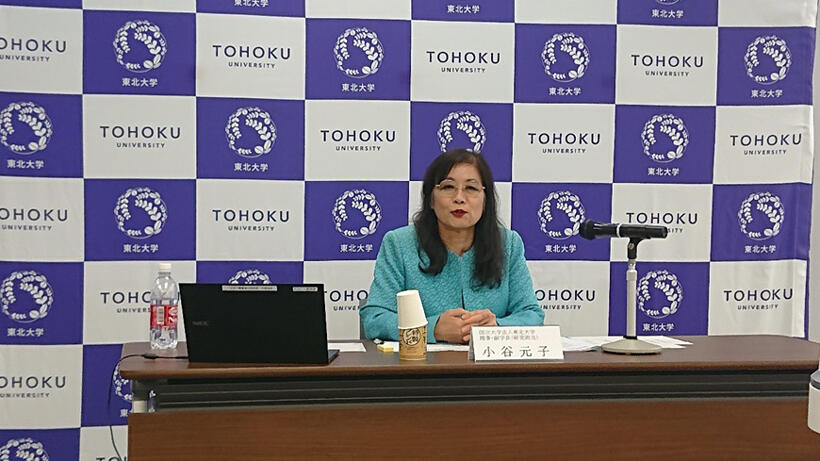Universities have contributed to society by advancing knowledge, enriching wisdom and fostering human resources, but much of this has been indirect. To contribute directly to society, the role of universities in the 21st century will involve taking tangible steps to make the most of the knowledge or wisdom that they create or developing human resources who can put such knowledge or wisdom into effect. Tohoku University has launched the Sustainability Open-Knowledge-Action Platform (SOKAP) as a new framework for embodying this new policy. Executive Vice President for Research Motoko Kotani of the University stated, "SOKAP is an initiative not only to advance cutting-edge research but also to solve actual social issues through collaboration with diverse stakeholders. We hope that by implementing this initiative, the university can contribute to transforming society."
Since its establishment in May last year, a committee of world-leading experts has been considering an initiative that would symbolically embody Tohoku University's vision of the Green Goals Initiative, and as a result of this consideration, the SOKAP concept was crystallized. With the aim of contributing to the realization of a sustainable society and the well-being of humanity, and through collaboration with diverse stakeholders, SOKAP will promote cutting-edge research through the Convergence of Knowledge, develop human resources that can transform society, and realize highly effective and reliable collaboration through two-way communication with society.
As a catalyst to encourage such collaboration, the problem-solving SOKAP-Connect program is being launched to engage diverse stakeholders. The project period is for two years with maximum annual support of five million yen. Four projects were selected this time.

One of the projects proposed by Professor Naomi Shibasaki-Kitakawa of the Graduate School of Engineering and Professor Kazuyo Matsubae of the Graduate School of Environmental Studies at the University is to generate new added value from unused rice bran, leading to sustainable production. Rice bran is milled in high volumes at large-scale rice mills, but only fresh rice bran, which amounts to one-third of the total domestic yield of rice bran, is the source of rice oil feedstock, while another third is used for mushroom beds and the remaining third is abandoned after milling and is disposed of because of its downgraded quality due to oil and fat degradation. Meanwhile, as the demand for rice oil has grown, the import of rice oil from abroad has expanded.
Shibasaki-Kitakawa and her colleagues have developed a separation-purification process in which quality nutrients can be extracted even from rice bran that has been decomposed and can be used in food, cosmetics and high-purity reagents, with the remainder of the extraction being allocated for biofuel. A venture company was launched in 2018, and an industrial-scale facility was completed in July 2020.
Shibasaki-Kitakawa said, "Cracked rice bran oil contains functional compounds, including super vitamin E, and is worth approximately 2000 yen per kilogram, with a potential value of approximately 4 billion yen for domestic production as a whole and 50 billion yen worldwide (calculated on the basis of a 14% utilization rate). We want to work with farmers, citizens and foreign companies to build up a database showing how much is available, where it is located and what its value is. Furthermore, we would like to establish a system for collecting the materials in a reasonably achievable way, building a new factory and exploring the usefulness of functional compounds."
Kotani stated, "Even though research and development has been undertaken, enormous barriers still exist in the real world to implementing the findings. SOKAP-Connect is designed to make an impact on society through collaborative thinking with industry, citizens, government and other stakeholders. Having set up the platform, we would like to connect various researchers from companies and our university in the Promotion Committee to promote the international standardization of new systems and technologies to create innovation."
In addition to promoting international projects at flagship institutions, such as the World Premier International Research Center Initiative (WPI) and the Frontier Research Institute for Interdisciplinary Sciences (FRIS) , that form the core of SOKAP as a value-creating site, Tohoku University will involve all kinds of ambitious researchers and to organically integrate both top-down and bottom-up research, thereby achieving decompartmentalization from the traditional disciplinary-based silos and systematically contributing to the well-being and future of humanity.
For human resources development, a new sustainability degree program will be introduced.
A pre-education period will be set up to facilitate dialog with a variety of internal and external stakeholders of the University, reviewing 'what and how to learn' and 'what the issues are.' As the ideal personal competence to fulfill these roles requires problem-setting skills with a challenging spirit as a driving force, the ability to involve society in problem-solving and collaboration, Kotani affirmed, "We will draw up an education program by starting to have discussions with students about what they want to learn. We will also work to develop human resources through the projects and SOKAP-Connect."
The success or failure of SOKAP depends on who is appointed as the coordinator.
As the implementation of the SDGs has reached the halfway point, the United Nation is conducting policy dialogs and other activities for post-SDGs. SOKAP brings together diverse human resources and Convergence of Knowledge to co-create future strategies and visions for the post-SDGs. Through the implementation of problem-solving projects and human resource development, SOKAP affects the deployment of outstanding research results in society as well as the active participation of the human resources it has developed.
In addition, based on societal feedback, it aims to create a positive cycle of bringing together human resources and Convergence of Knowledge to solve new challenges. This requires the coordination of staff members.
Kotani said, "we would like to nominate an executive director, as recommended by overseas experts." The future selection of personnel will be crucial to SOKAP's success or failure.
This article has been translated by JST with permission from The Science News Ltd. (https://sci-news.co.jp/). Unauthorized reproduction of the article and photographs is prohibited.




